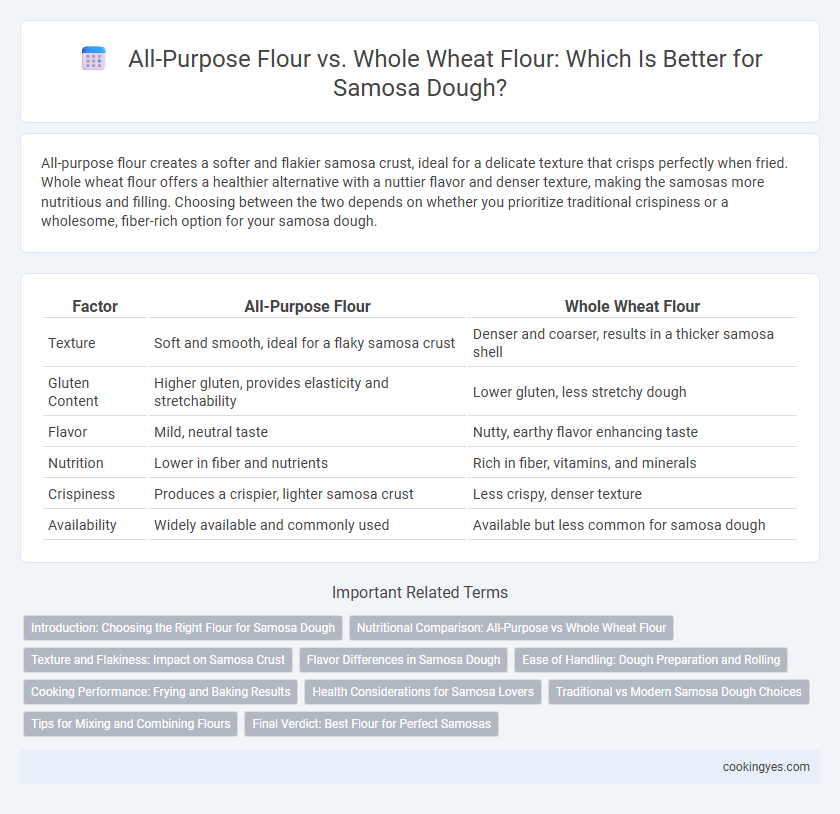All-purpose flour creates a softer and flakier samosa crust, ideal for a delicate texture that crisps perfectly when fried. Whole wheat flour offers a healthier alternative with a nuttier flavor and denser texture, making the samosas more nutritious and filling. Choosing between the two depends on whether you prioritize traditional crispiness or a wholesome, fiber-rich option for your samosa dough.
Table of Comparison
| Factor | All-Purpose Flour | Whole Wheat Flour |
|---|---|---|
| Texture | Soft and smooth, ideal for a flaky samosa crust | Denser and coarser, results in a thicker samosa shell |
| Gluten Content | Higher gluten, provides elasticity and stretchability | Lower gluten, less stretchy dough |
| Flavor | Mild, neutral taste | Nutty, earthy flavor enhancing taste |
| Nutrition | Lower in fiber and nutrients | Rich in fiber, vitamins, and minerals |
| Crispiness | Produces a crispier, lighter samosa crust | Less crispy, denser texture |
| Availability | Widely available and commonly used | Available but less common for samosa dough |
Introduction: Choosing the Right Flour for Samosa Dough
All-purpose flour offers a soft and flaky texture ideal for traditional samosa dough, while whole wheat flour provides a nuttier flavor and denser bite, enhancing nutritional value. The choice between these flours affects the dough's elasticity and crispness, crucial for achieving perfect samosas. Understanding the properties of each flour helps in selecting the best option tailored to desired texture and taste.
Nutritional Comparison: All-Purpose vs Whole Wheat Flour
Whole wheat flour offers higher fiber content and essential nutrients like iron, magnesium, and vitamin B6 compared to all-purpose flour, making samosa dough more nutritious and beneficial for digestion. All-purpose flour, being more refined, contains fewer fibers and micronutrients but provides a lighter, crispier texture preferred in traditional samosas. Choosing whole wheat flour enhances the nutritional profile of samosas while slightly altering the texture and color, supporting a healthier diet without sacrificing flavor.
Texture and Flakiness: Impact on Samosa Crust
All-purpose flour creates a lighter, flakier samosa crust due to its moderate protein content, which develops enough gluten for a crisp texture without toughness. Whole wheat flour results in a denser, coarser texture with a slightly nutty flavor, often producing a sturdier but less flaky crust. For optimal samosa dough, blending both flours can balance flakiness and structure, enhancing overall texture.
Flavor Differences in Samosa Dough
All-purpose flour produces a light and crispy samosa crust with a neutral flavor that allows the filling's spices to stand out. Whole wheat flour imparts a nuttier, earthier taste to the dough, adding depth and complexity to the overall flavor profile. The choice between flours significantly affects the samosa's texture and taste, with whole wheat providing a heartier bite and richer aroma.
Ease of Handling: Dough Preparation and Rolling
All-purpose flour creates samosa dough that is softer and more pliable, making it easier to knead and roll into thin sheets without cracking. Whole wheat flour results in a denser, coarser dough that can be challenging to roll out evenly, often requiring more water and rest time to improve elasticity. For smoother handling during preparation and rolling, all-purpose flour is preferred due to its fine texture and gluten content.
Cooking Performance: Frying and Baking Results
All-purpose flour produces samosa dough with a lighter, crispier texture when fried due to its moderate protein content, allowing for a tender yet sturdy shell. Whole wheat flour results in a denser, heartier crust that absorbs more oil during frying, leading to a chewier texture and richer flavor profile. When baked, all-purpose flour delivers a crisp outer layer with a soft interior, while whole wheat flour yields a more fibrous and rustic samosa with enhanced nutritional value.
Health Considerations for Samosa Lovers
Whole wheat flour offers higher fiber content and essential nutrients like iron and magnesium, promoting better digestion and sustained energy compared to all-purpose flour. All-purpose flour, being more refined, results in a lighter, crispier samosa but lacks the nutritional benefits found in whole wheat flour. Choosing whole wheat flour for samosa dough supports heart health and helps maintain stable blood sugar levels, making it a healthier option for regular samosa lovers.
Traditional vs Modern Samosa Dough Choices
Traditional samosa dough typically uses all-purpose flour, which provides a light, crispy texture favored in classic recipes across India and Pakistan. Modern samosa variations increasingly incorporate whole wheat flour to enhance nutritional value and add a nuttier flavor while maintaining sufficient crunchiness when properly prepared. Balancing gluten content from all-purpose flour with fiber-rich whole wheat flour can create a hybrid dough, offering both authenticity and health benefits for contemporary samosa enthusiasts.
Tips for Mixing and Combining Flours
When making samosa dough, combining all-purpose flour and whole wheat flour can enhance texture and flavor balance; start with a ratio of 70% all-purpose flour to 30% whole wheat flour for optimal elasticity and crispiness. Gradually incorporate water while kneading to achieve a smooth and pliable dough, avoiding overmixing to prevent toughness. Resting the dough for at least 30 minutes allows gluten to relax, ensuring easier rolling and crispier samosas after frying.
Final Verdict: Best Flour for Perfect Samosas
For perfect samosas, all-purpose flour offers a crispier and flakier texture due to its lower protein content and smooth consistency, making it ideal for traditional recipes. Whole wheat flour provides a nuttier flavor and higher fiber content, resulting in a denser and slightly chewier dough that enhances nutritional value but may affect crispness. Choosing all-purpose flour ensures a crisp, light samosa shell, while whole wheat is best for a healthier yet less delicate pastry.
All-purpose flour vs whole wheat flour for samosa dough Infographic

 cookingyes.com
cookingyes.com